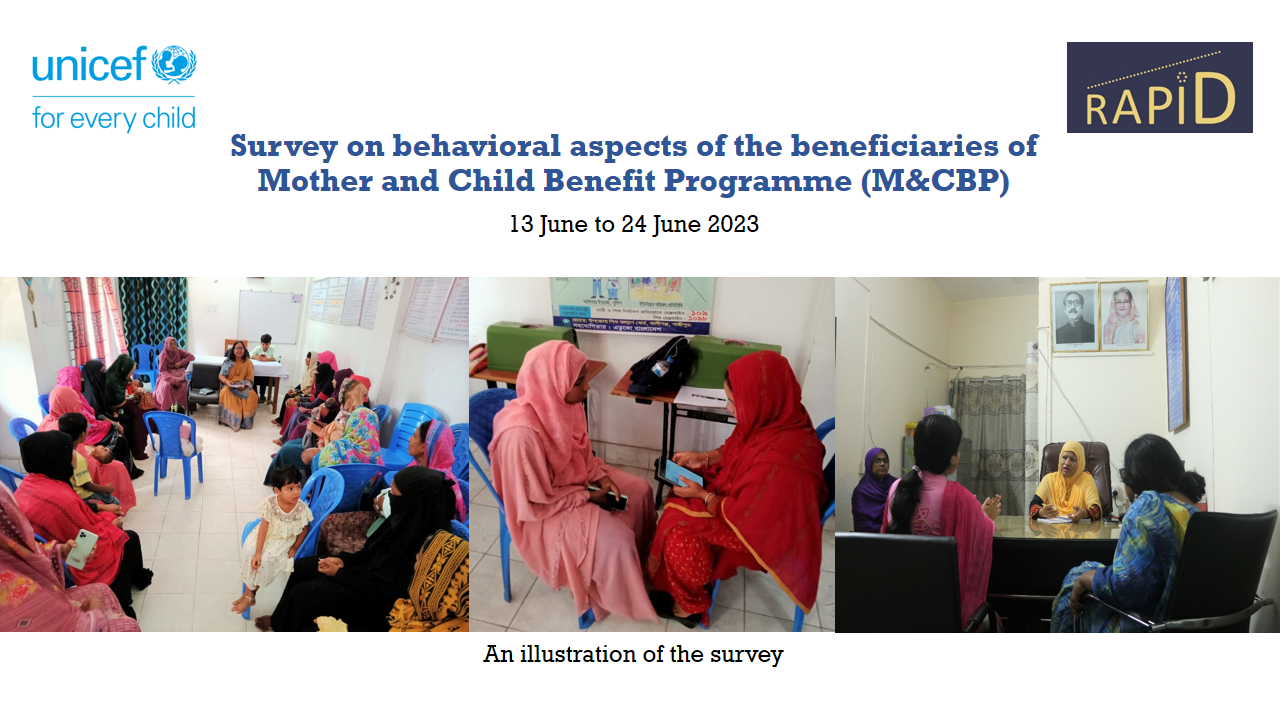Bangladesh–EU Trade and Geoeconomics
RAPID in Media: Preparing next budget a daunting task amid IMF pressure and global economic slowdown
Assessment of Skills Demand and Skills Gaps in the Business Process Outsourcing (BPO) Industry of Bangladesh
Knowledge, Attitude and Practices (KAP) survey on behavioral aspects of the beneficiaries of Mother and Child Benefit Programme (M&CBP)
Contents
About the project
Partner: UNICEFProject duration: 13 March 2023 - 20 August 2023
The main purpose of the KAP project is to survey the Mother & Child Benefit Programme (M&CBP) beneficiaries across Bangladesh to explore key aspects related to nutrition, and better understand the perception, practices, and knowledge of the M&CBP beneficiaries around maternal nutrition and factors affecting household decisions in food consumption.
This assignment covers the following activities:
(i) Profiling the M&CBP beneficiaries in terms of their demographic and socioeconomic features. (ii) Assessing the baseline nutrition related knowledge and practices of the beneficiaries from both rural and urban areas. (iii) Documenting how the financial assistance provided to pregnant and lactating women through the M&CBP is being used for nutrition purposes. (iv) Identifying the barriers and other knowledge gaps, social and cultural beliefs, which impede the practice of desired behaviours and the utilisation of nutrition and other services. (v) Assessing the efficacy of the current interventions under the M&CBP in increasing nutrition related knowledge of the beneficiaries and improving their dietary practices and food intake.
Project activities
Stakeholders Consultation: Knowledge, Attitude and Practice Survey on Behavioural Aspects of the Beneficiaries of the Mother and Child Benefit Programme
On 30 May 2024, a Stakeholders Consultation on the Knowledge, Attitude, and Practice Survey (KAPS) related to the Behavioural Aspects of Beneficiaries of the Mother and Child Benefit Programme was held at the Intercontinental, Dhaka. This significant event was jointly organized by the Department of Women's Affairs, Ministry of Women and Children Affairs, and UNICEF Bangladesh. The study was conducted by Research and Policy Integration for Development (RAPID) with the support of UNICEF. Ms Nazma Mobarek, Secretary of the Ministry of Women and Children Affairs (MOWCA), was present as Chief Guest. Mr Michal Krejza, Minister Counsellor, Head of Development Cooperation, EU, and Ms Emma Brigham, Deputy Representative, UNICEF Bangladesh, were present as Special Guest. Ms Keya Khan, Director General of the Department of Women Affairs (DWA), was the Chair of the event and the event was moderated by Mr Stanley Gwavuya, Chief of Social Policy, UNICEF Bangladesh.Keynote presentation on the KAPS findings was delivered by Dr M Abu Eusuf, Executive Director of RAPID and Dr Deen Islam, Research Director of RAPID. This research marked a pivotal step in enhancing our understanding and effectiveness through insightful data and collaborative efforts. Experts and government representatives praised the rigorous methodology and emphasized the importance of implementing the recommendations.

Fieldwork: Survey on behavioral aspects of the beneficiaries of Mother and Child Benefit Programme (M&CBP)
RAPID research team has carried out ten Key Informant Interviews (KIIs) and five Focus Group Discussions (FGDs) in the Poba and Godagori Union of Rajshahi as well as Kaliganj Upazila, Gazipur. These qualitative data collection methods allowed for an in-depth exploration of the beneficiaries' perspectives and experiences regarding the M&CBP. The KIIs provided insights from key individuals involved in implementing and overseeing the program, while the FGDs allowed for group discussions among the beneficiaries themselves.Additionally, a pilot study was conducted in Kaliganj Upazila, Gazipur. The purpose of this pilot study was to test the survey instruments and refine the data collection process before conducting the main survey. It allowed the research team to identify any issues or challenges that may arise and make necessary adjustments for the subsequent fieldwork.



